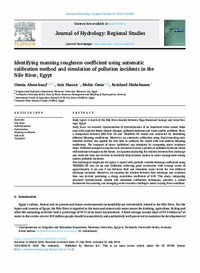Identifying manning roughness coefficient using automatic calibration method and simulation of pollution incidents in the Nile River, Egypt

Authors:
Study region
A reach of the Nile River located between Naga Hammadi barrage and Asyut barrage, Egypt
Study focus
An accurate representation of hydrodynamics of an important water source helps cope with expected future climate changes, pollution incidents and water quality problems. Here, a comparison between HEC-RAS 1D and TELEMAC-2D model was conducted by identifying different Manning coefficients. Moreover, an automatic calibration using Dual-Annealing optimization method was applied for first time to calibrate the model with non-uniform Manning coefficients. The transport of tracer (pollution) was simulated by computing tracer residence times. Pollution transport scenarios were discussed to draw a picture of pollution incidents which will continue to happen in the future. An equation indicating the relation between flow discharge and residence time was derived to hurriedly help decision makers in water management during sudden pollution incidents.
New hydrological insights for the region
A model with spatially variable Manning coefficients using TELEMAC-2D was set up and calibrated achieving good accuracyies with average errors of approximately 4 cm and 7 cm between field and simulated water levels for two different discharge scenarios. Moreover, an equation for relation between flow discharge and residence time was derived producing a strong correlation coefficient of 0.95. This study, integrating advanced hydrodynamic models and automatic calibration techniques, provides a robust framework for assessing and managing water resource challenges under varying flow conditions.
